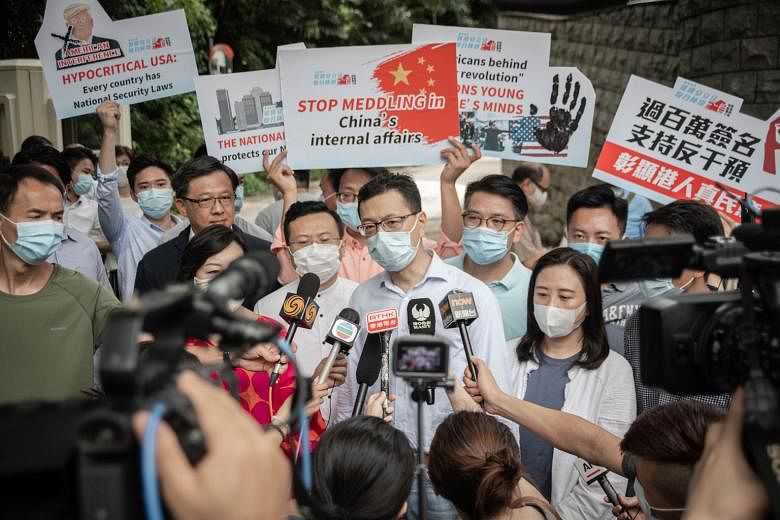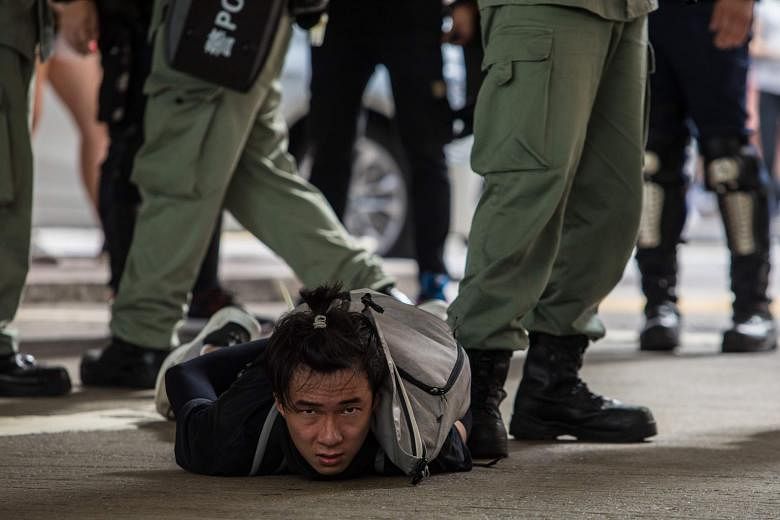BEIJING • China warned Britain yesterday that it could retaliate with "corresponding measures" over London's decision to extend a broader path to citizenship for Hong Kong residents, after Beijing imposed a new security law in the former British colony this week.
Britain's plan covers almost three million Hong Kongers who either hold a British National Overseas (BNO) passport or are eligible to apply for one.
"China strongly condemns that and reserves the right to make further reactions," Foreign Ministry spokesman Zhao Lijian said, adding that all BNO passport holders were Chinese citizens.
"All the consequences shall be borne by the UK side."
Prior to Hong Kong's handover in 1997, Mr Zhao said, "the British side clearly promised that they would not grant residence permits to the BNO holders". London was now reneging on its word, he said.
"If the British side makes unilateral changes to the relevant practice, it will breach its own position and pledges as well as international law and basic norms governing international relations," the Chinese Embassy in London said.
"We firmly oppose this and reserve the right to take corresponding measures."
China has never publicly raised the possibility of offering Britons either Chinese citizenship or broader residency rights.
Britain had sought closer ties with China after ending its decades-long membership in the European Union this year.
But London irked the United States in January by letting Chinese telecoms giant Huawei supply technology for its new 5G network, and it is now studying how it can cut Huawei out of its system entirely.
Despite Britain's offer to Hong Kongers, Foreign Secretary Dominic Raab conceded that there was little London could do if China refuses to let them relocate. Britain could use "diplomatic leverage (and) other ways" to try to soften China's approach to Hong Kong and not follow through on the full force of the sweeping security law, Mr Raab told ITV on Wednesday.
"But ultimately we need to be honest that we wouldn't be able to force China to allow BNOs to come to the UK," he said.
Australia is also considering providing safe haven to Hong Kong residents in response to the new law.
Prime Minister Scott Morrison yesterday said the situation in Hong Kong was "very concerning" and that his government was "very actively" considering proposals to welcome the city's residents.
Asked if Australia could extend an offer of safe haven, Mr Morrison said "yes", adding that the measures would soon be considered by his Cabinet and hinting strongly that it would be approved. "We think that's important and very consistent with who we are as a people," he said.
The Chinese Embassy in Canberra told Australia to "stop meddling in China's internal affairs".
Any offer is sure to further strain Canberra's relationship with Beijing, coming after repeated clashes between the two sides.
Most recently, Australia enraged China by calling for an independent investigation into the origins of the coronavirus pandemic. It has also pushed back against what it says is China's economic "coercion", covert influence campaigns and the use of Chinese tech firms like Huawei for intelligence-gathering and geopolitical leverage.
In Taiwan, the government yesterday said it received more than 180 inquiries from people in Hong Kong on the first day of opening a new office to help Hong Kongers seeking to flee the city. The office in Taipei had opened on Wednesday, the same day Hong Kong's new security law came into force.
Mr Chiu Chui-Cheng, deputy head of Taiwan's Mainland Affairs Council, said the new law was "the most outrageous in history" with a reach that extended everywhere.
"Taiwan people should avoid making unnecessary visits to or transits via Hong Kong, Macau and the mainland," he said.
Meantime, the US House of Representatives passed a Bill imposing sanctions on banks that do business with Chinese officials involved in cracking down on Hong Kong protesters. It would have to be approved by the Senate and then President Donald Trump.
The Hong Kong authorities arrested 10 people under the new national security law during Wednesday's protests.
Separately, a 24-year-old man was arrested at Hong Kong's airport yesterday on suspicion of attacking and wounding a police officer during the protests. The police had posted photos online of an officer with a bleeding arm, saying he was stabbed by "rioters holding sharp objects".
Local media, citing unnamed sources, said the suspect was on a Cathay Pacific flight to London due to depart just before midnight. The suspect held an expired BNO passport, the sources said.
AGENCE FRANCE-PRESSE, BLOOMBERG, REUTERS


